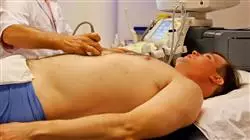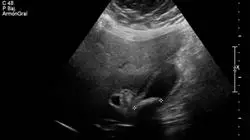University certificate
The world's largest faculty of medicine”
Introduction to the Program
Specialize! The development of diagnostic and therapeutic techniques for liver pathologies has turned hepatology into an area of knowledge or specific education that is highly demanded by medical professionals today"

Hepatology has experienced great changes in recent years. There have been important developments in the last 35-40 years, in both diagnostic and treatment techniques. In terms of diagnosis, we have seen the introduction of Ultrasound, Computerized Axial Tomography, Nuclear Magnetic Resonance, FibroScan, etc.
With regard to treatment, we have gone from patiently observing the evolution of liver disease without being able to offer patients anything, to now being able to prescribe effective treatments such as new antivirals for hepatitis B and C, immunosuppressants for autoimmune diseases or liver transplantation for end-stage liver disease.
All this has meant that Hepatology today constitutes a specific area of knowledge, which sometimes exceeds the objectives of the digestive system specialists' education period, thereby implying the need for professional development and the existence of skilled professionals.
It is essential that specialists can respond adequately to the evolution of these events, through an adequate update of their knowledge and the incorporation of these advances in their daily medical practice, which is why TECH has developed this comprehensive program in response to an in-demand specialty.
You will learn in depth about the advances made in the diagnosis and treatment of viral hepatitis, the recognition of new liver pathologies and the generalization of liver transplantation"
The Professional master’s degree in Hepatology contains the most complete and updated scientific program on the market. The most important features of the program include:
- More than 80 clinical cases, presented by experts in the different specialties. The graphic, schematic, and practical contents with which they are created, provide scientific and practical information on the disciplines that are essential for professional practice
- New diagnoses and treatments for different hepatic pathologies
- Presentation of practical workshops on procedures, diagnosis, and treatment techniques
- An algorithm-based interactive learning system for decision-making in the clinical situations presented throughout the course
- Special emphasis on evidence-based medicine and research methodologies in the field of hepatology
- All of this will be complemented by theoretical lessons, questions to the expert, debate forums on controversial topics, and individual reflection assignments
- Content that is accessible from any fixed or portable device with an Internet connection
This Professional master’s degree may be the best investment you can make when choosing a refresher program for two reasons: in addition to updating your knowledge in Hepatology, you will obtain a Professional master’s degree from TECH Global University"
The program’s teaching staff includes a team of healthcare professionals, who bring their experience to this training program, as well as renowned specialists from leading scientific societies.
The multimedia content, developed with the latest educational technology will provide the professional with situated and contextual learning, i.e., a simulated environment that will provide immersive training, programmed for training in real situations.
This program is designed around Problem Based Learning, whereby the physician must try to solve the different professional practice situations that arise during the course. For this purpose, the specialist will be assisted by an innovative interactive video system created by renowned and experienced experts in treating patients with hepatic pathology with extensive teaching experience.
Increase your decision-making confidence by updating your knowledge through this Professional master’s degree"

Make the most of the opportunity and choose to stay up to date, to improve your medical practice with your patients"
Why study at TECH?
TECH is the world’s largest online university. With an impressive catalog of more than 14,000 university programs available in 11 languages, it is positioned as a leader in employability, with a 99% job placement rate. In addition, it relies on an enormous faculty of more than 6,000 professors of the highest international renown.

Study at the world's largest online university and guarantee your professional success. The future starts at TECH”
The world’s best online university according to FORBES
The prestigious Forbes magazine, specialized in business and finance, has highlighted TECH as “the world's best online university” This is what they have recently stated in an article in their digital edition in which they echo the success story of this institution, “thanks to the academic offer it provides, the selection of its teaching staff, and an innovative learning method aimed at educating the professionals of the future”
A revolutionary study method, a cutting-edge faculty and a practical focus: the key to TECH's success.
The most complete study plans on the university scene
TECH offers the most complete study plans on the university scene, with syllabuses that cover fundamental concepts and, at the same time, the main scientific advances in their specific scientific areas. In addition, these programs are continuously being updated to guarantee students the academic vanguard and the most in-demand professional skills. In this way, the university's qualifications provide its graduates with a significant advantage to propel their careers to success.
TECH offers the most comprehensive and intensive study plans on the current university scene.
A world-class teaching staff
TECH's teaching staff is made up of more than 6,000 professors with the highest international recognition. Professors, researchers and top executives of multinational companies, including Isaiah Covington, performance coach of the Boston Celtics; Magda Romanska, principal investigator at Harvard MetaLAB; Ignacio Wistumba, chairman of the department of translational molecular pathology at MD Anderson Cancer Center; and D.W. Pine, creative director of TIME magazine, among others.
Internationally renowned experts, specialized in different branches of Health, Technology, Communication and Business, form part of the TECH faculty.
A unique learning method
TECH is the first university to use Relearning in all its programs. It is the best online learning methodology, accredited with international teaching quality certifications, provided by prestigious educational agencies. In addition, this disruptive educational model is complemented with the “Case Method”, thereby setting up a unique online teaching strategy. Innovative teaching resources are also implemented, including detailed videos, infographics and interactive summaries.
TECH combines Relearning and the Case Method in all its university programs to guarantee excellent theoretical and practical learning, studying whenever and wherever you want.
The world's largest online university
TECH is the world’s largest online university. We are the largest educational institution, with the best and widest online educational catalog, one hundred percent online and covering the vast majority of areas of knowledge. We offer a large selection of our own degrees and accredited online undergraduate and postgraduate degrees. In total, more than 14,000 university degrees, in eleven different languages, make us the largest educational largest in the world.
TECH has the world's most extensive catalog of academic and official programs, available in more than 11 languages.
Google Premier Partner
The American technology giant has awarded TECH the Google Google Premier Partner badge. This award, which is only available to 3% of the world's companies, highlights the efficient, flexible and tailored experience that this university provides to students. The recognition as a Google Premier Partner not only accredits the maximum rigor, performance and investment in TECH's digital infrastructures, but also places this university as one of the world's leading technology companies.
Google has positioned TECH in the top 3% of the world's most important technology companies by awarding it its Google Premier Partner badge.
The official online university of the NBA
TECH is the official online university of the NBA. Thanks to our agreement with the biggest league in basketball, we offer our students exclusive university programs, as well as a wide variety of educational resources focused on the business of the league and other areas of the sports industry. Each program is made up of a uniquely designed syllabus and features exceptional guest hosts: professionals with a distinguished sports background who will offer their expertise on the most relevant topics.
TECH has been selected by the NBA, the world's top basketball league, as its official online university.
The top-rated university by its students
Students have positioned TECH as the world's top-rated university on the main review websites, with a highest rating of 4.9 out of 5, obtained from more than 1,000 reviews. These results consolidate TECH as the benchmark university institution at an international level, reflecting the excellence and positive impact of its educational model.” reflecting the excellence and positive impact of its educational model.”
TECH is the world’s top-rated university by its students.
Leaders in employability
TECH has managed to become the leading university in employability. 99% of its students obtain jobs in the academic field they have studied, within one year of completing any of the university's programs. A similar number achieve immediate career enhancement. All this thanks to a study methodology that bases its effectiveness on the acquisition of practical skills, which are absolutely necessary for professional development.
99% of TECH graduates find a job within a year of completing their studies.
Professional Master's Degree in Hepatology
The Professional Master's Degree in Hepatology of the Faculty of Medicine of TECH Global University has a significant relevance if we consider that, according to the World Health Organization (WHO), it is estimated that more than 328 million people in the world are infected with the hepatitis B and C virus. Accessing this higher education program, therefore, contributes to educating new health professionals trained to prevent, diagnose and apply treatments related to liver diseases such as hepatitis, cancer, cirrhosis or liver transplantation.
Educate yourself in the largest digital university in Spanish
One of the advantages of TECH lies in its online, but especially in its learning methodology known as relearning and in its constant updating of information. In the case of hepatology, this specialty of medicine has undergone major changes and developments in the last 35 years, so our Professional Master's Degree has adapted to this gradual evolution. This is why the structure of the contents is mainly focused on the knowledge of new antiviral treatments, recently discovered immunosuppressants or end-stage liver transplants. However, it is also studied the diagnosis through ultrasound, computed axial tomography, nuclear magnetic resonance or FibroScan, among other methods.







